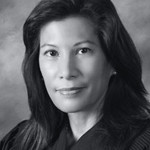After the statewide message, Kim Turner, executive director of Marin Superior Court, “… said Marin has fared better than other counties because its population has not exploded. But she said Marin stands to lose money as court funding is spread to counties in dire shape.”
Chief Justice Continues Funding Push
Court Funding Gets S.D. ABC Report
‘Alliance’ Judges Continue Court Critique
$70m Shortfall Is Budget Cred Issue
Gov. May ‘Remake’ State Supreme Court
Chief Justice Seeks Another $266m For Courts
Think what you will of California Chief Justice Tani Cantil-Sakauye, she is proving relentless at advocating for increased courts funding. A recent example came with an KABC Los Angeles Eyewitness News interview with Adrienne Alpert, who asked tough questions about court management and budget issues.
Alpert notes that “… chief justices rarely agree to interviews, but Cantil-Sakauye is adamant the $105 million the governor added to the judicial budget is not nearly enough” then adds that “the chief justice says it will actually take $266 million to keep the courts running as they are and more than double that to fully serve the public.”
The interview is interesting, in part, because it refines the likely points as the state budget annual deadline moves into the two-month range. See video and text of the story here.
Court Interpreters Are Another Budget Issue
Follow the reporter on Twitter: @KPCCRina911
City Watch Hits Flat-Fee Juvenile Defense Issue
Class-Action Suit Seeks Judicial Back Pay
You can read the report here.
Civil Rights Becoming Key Budget Argument
The chief justice’s comments are getting broad play around the state, and even the Los Angeles Times, which has not exactly been a leader in the court crisis coverage, took note. You can see the Times story here.

